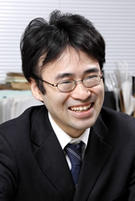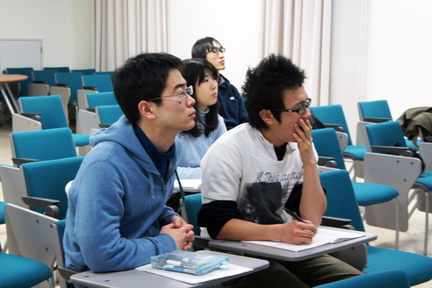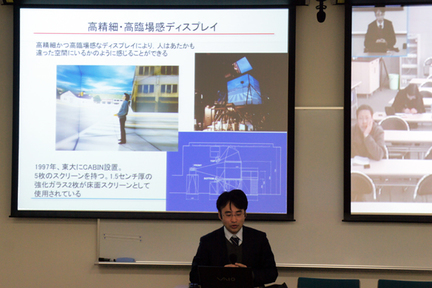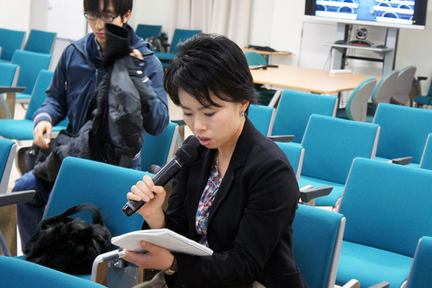I Want to Learn How to Think Beyond Academic Disciplines
Vol.11 2012.12.19 TANIKAWA, Tomohiro
Transitions in Memory and Documents II
As smartphones like iPhone become widespread, many people have come to carry them around all the time. These devices do not only have high calculation ability and high definition displays, but they also possess numerous sensors like camera and GPS, which can potentially document our actions in electronic media. Records kept in the History of our emails and SNS as well as such sensors are the history of people's action and thinking, and they have potentials for transforming people's memory and thinking when they look at these records. We therefore come to possess a far greater ability of memory with these devices than when we are on our own. Such expanded memories will form the memory of society at large, beyond individual use.
In this lecture, I would like to discuss how far we can record and replicate the memory of people and society, by taking you through the cutting-edge research on mobile computing, ubiquitous computing, VR, etc.
- Instructor
-

- TANIKAWA, Tomohiro
- Graduated from the Department of Industrial Mechanical Engineering, the University of Tokyo in 1997. Finished the Doctoral Program of the University in 2002. Began serving as a researcher at the Telecommunications Advancement Organization of Japan that year. The job title changed in 2004 due to an organizational reform to a researcher at the National Institute of Information and Communications Technology. Appointed as a Lecturer at the Research Center for Advanced Science and Technology, the University of Tokyo, in 2005. Since 2006 has been serving as a Lecturer at the Graduate School of Information Science and Technology. Engaged in researches concerning image-based rendering as well as MR. Ph.D. in Engineering.
comments(最新2件 / 4)
- 2012年12月25日 10:56 reply
前回に引き続き「記憶と記録の変容」というテーマでの講義、ありがとうございました。
マガーク効果など「心理」や「認知脳科学」の授業を取った際に学んだことが出てきたときは横断的な学術分野をつくづく意識しました。個人的には、人の拡張したアバタへの順応力(『ワンピース』での主人公ルフィのようなゴムゴムの体への順応など)は驚きました。こうした能力は、昔から人類を始めとする生き物はみな変化に対応しながら進化してきたことの証明になるのでしょうか。
無意識的な選択を行なっている≒自由意志はどこにある?という議題を聞いて、ふと哲学的ゾンビの問題が頭に浮かびました。古代の学者は科学も哲学も等しく修めていたというので、様々な視点を持っていることが学問の進歩に繋がるのではとも思います。
また完全な追体験を実現するには主観も同じにしなければならないわけで、しかし主観が同じになるというのは非常に恐ろしいことだと思いました。研究を深め実現可能にするにしても、実行するかどうかは議論を重ねなければならないでしょう。
- 2012年12月26日 13:41 reply
前回に引き続き、講義「記憶と記録の変容」、大変興味深いお話ありがとうございました。
人間は無意識的な選択を行っているということの発見は、自由意思がどこにあるのか、という重要な論点を炙り出すことです。
非常に有意義な研究ではありますが、どこまでこの社会に用いていいのか、科学倫理が今日ますます重要になってくることを再確認いたしました。
- 2013年01月02日 20:56 reply
人間の認識・感覚は考えれば考えるほど奇妙。というのも適度なあいまいさを持ちながら、かといってそれが不正確に認知されてはならないのですから。手はひっぱりに対して高い反応を示し、押しこみに対してはそれほどでもない。これは手を引かれるような状況の方が重要度が高い場合が多いということを表しています。力学的に対称ではない「不自然」な人間の感覚は、僕らの自然となっており、教科書的ではないところです。つまり感覚と言う側面から言えば自然界で普遍的に生じている「保存則」は捻じ曲げられるということを意味しています。冷たいよりも熱いほうが手をひっこめたくなるのは、ある意味で非対称的です。僕たちは感覚を拡張出来ることも知っている。あらゆる道具は僕らの感覚の延長線上にある。僕らの感覚は訓練によって次第に新たな領域に慣らされ、拡張されていく。それこそあいまいさを持つ感覚だけに出来る業だと思います。ならば人間を機械に接続することも可能だと思います。義手は自分の手と同様になるでしょう。遠隔地にある機械の腕も自分の腕になるでしょう。あるいは記憶も、感覚の一種であると考えれば、他人の記憶を共有したり発信したり、出来ないことはないと思います。人間のアンドロイド化や記憶のデジタル化など、倫理にかかわってくるところです。しかし科学にはぜひまい進してもらいたいと思います。誰だってそれが正しいか正しくないかは、そのものが現実となってからでなくては分からないのですから。また、なってからでも、まったく遅くはないと思うので。…長くなってしまい申し訳ないです!!
Post a Comment
- Other Lessons




温度や自らの表情の知覚によって、人間が無意識的な選択を行っているというお話を聞いて、至極興味深いと思いました。人間の自由意思がある意味幻想であることのはっきりとした証拠であり、技術が発達してこの作用が一般的に利用されるとすると、有用である一方で恐ろしくもあります。方法次第でいかにでも恣意的な効果をもたらすことができ、かつ人間はそれを認識できないのですから人権にも関わる問題になるかもしれません。前回と今回を通して、科学技術の進歩の魅力と恐ろしさを感じ、将来の社会について考える良い機会となりました。ありがとうございました。